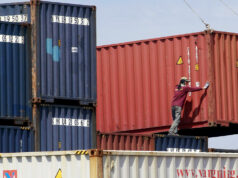Durian industry pushing to be included in China trade deal amid weak domestic sales
DAVAO CITY — It’s durian season in Mindanao and growers are struggling to find a market for their produce — so they’ve set their sights on China.
“This is a major challenge in the fruit industry. Mahirap magpalabas ng mga prutas ngayon (It’s difficult to transport fruits nowadays),” Candelario B. Miculob, former president of the Davao City Durian Industry Council, said in an online interview.
While agricultural products are exempt from quarantine restrictions imposed to mitigate the spread of the coronavirus disease 2019 (COVID-19), Mr. Miculob said they are limited by available land transport services and flights.
Fewer people are going out and social gatherings are still banned or discouraged in many areas, he said.
The annual Durian Festival, held every August to September alongside the Kadayawan Festival in Davao City, is not happening this year after the local government suspended all major events for the rest of 2020.
In the Davao Region, durian growers typically harvest up to 48 metric tons each season.
There are at least four processing plants in the region that can make frozen packs from the fresh produce.
Mr. Miculob said the industry’s sales dropped after the April and May harvest, when a strict form of lockdown was in place nationwide.
The plunge in domestic demand, he said, highlights the industry’s continued push for the government to have durian included in the bilateral trade deal with China — which growers have been calling for since at least 2016.
That year, the industry was able to ship four 40-foot container vans of frozen durian to China, but coursed through accredited countries such as top exporter Thailand.
“We are hoping that the accreditation of Philippine durian to China will materialize soon for us to be able to export to China. Ang pag-asa namin ay sa labas (Our future is in export),” he said.
Mr. Miculob added that having the accreditation will open the door for foreign investors to set up more processing plants in the region.
In 2018, he said, Chinese traders expressed interest in procuring volumes that exceeded local output.
“There is no limit in terms of volume requirement. The only problem is we have limited processing capacity. It is easier to export and it is also advantageous for us,” he said.
Thailand exported $567.29 million worth of durian to China in the four months to April, according to a July 27 Bangkok Post report citing government data.
Malaysia received accreditation for frozen durian to China last year.
For the Philippines, fruits with current access to the Chinese market include banana, avocado and coconut. — Maya M. Padillo



